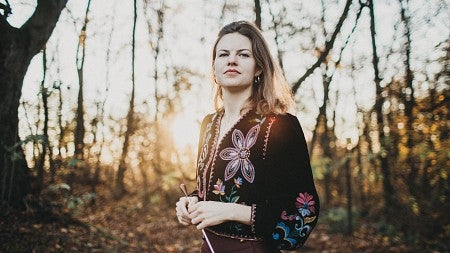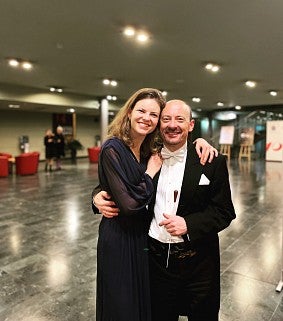
Photographer Grzegorz Mart
Polish musician Anna Sułkowska-Migoń never had any intention of becoming a conductor. She was dedicated to studying the viola in college, that is, until she started to feel immense frustration during performances. “I realized I couldn't express myself as I wanted to with the instrument,” she recalled. “I was stressed and frustrated on stage because I could not survive as a soloist.”
It was her father, Piotr Sułkowski, an accomplished conductor, who gently encouraged her to explore conducting. Sułkowska-Migoń was hesitant, to say the least. “As a conductor’s child, I saw how the profession makes it difficult to achieve a work-life balance, since a lot of travel is required.” She reluctantly added on a few conducting courses in school, feeling resentful for the first three months of her studies.
Her parents persuaded her to stick with it at least until her first concert. She did exactly that and fell in love. “After my first concert as conductor, I felt happy,” she recalled. “I had found my place.”

Anna poses with her father, Piotr
Today, her “energetic charm” (Le Monde) radiates through her performances as a conductor. And her exceptional talent has earned her top billing for Oregon Bach Festival’s (OBF) staging of Grammy Award-winning, Credo. Celebrating the 25th anniversary of OBF’s commissioning of the work, she is ecstatic to take the stage. "It's crazy for me!” she mused. “It is crazy. And, of course, I am very moved and excited.”
Credo holds a piece of Sułkowska-Migoń’s heart for a multitude of reasons. First, she has had a connection to the work since she was a little girl. Her father, Piotr, came to OBF to take part in the commissioning of Credo in 1998 as assistant conductor. Later, Piotr was assistant conductor in Polish performances. During her preparation for Credo, Sułkowska-Migoń has called upon her father for guidance occasionally. “It is funny because when I come across a problem and ask him for help, I am so annoyed when he gives me a simple solution!” she laughed.
Additionally, she has a personal connection to Credo composer, Krzysztof Penderecki. As a child, she met Penderecki for the first time after a concert she attended in Poland. She later knew him as a maestro, playing viola under his baton at a Polish concert. She also studied at the K. Penderecki Academy of Music in Poland, named after the esteemed composer. At the Academy, she wrote her master’s thesis on Credo. Following Penderecki’s death in 2020, she developed a personal relationship with his wife, Elżbieta.
As a devout Polish Catholic, Credo’s exploration of faith resonates with Sułkowska-Migoń. The Latin word “credo,” meaning “I believe,” reflects her own beliefs and connects to her deeply. “It's important to me because I believe,” she said. “It is connected with my soul. But, to me, it also evokes inclusion because even if you are not from the church, even if you are an atheist, you can still say you believe in something.”
Finally, as an instructor of the Scouting Association of the Republic of Poland, Sułkowska-Migoń is committed to promoting musical culture in young people. She launched the “Scouting Song” project, which is an album of scout songs re-arranged in a new, jazz version. With this emphasis on music education, it is an honor for her to conduct the youth choirs in Credo. “I will be able to witness how important it will be for them to sing in this massive project,” she said excitedly. “Watching how moved they will be, is going to be very powerful.”
An assistant conductor on the piece last year, she is thrilled to prove how much she has developed as a conductor of the powerful and vivid piece. Tickets for Credo’s July 9 performance at the Hult Center for the Performing Arts are available at OregonBachFestival.org.
